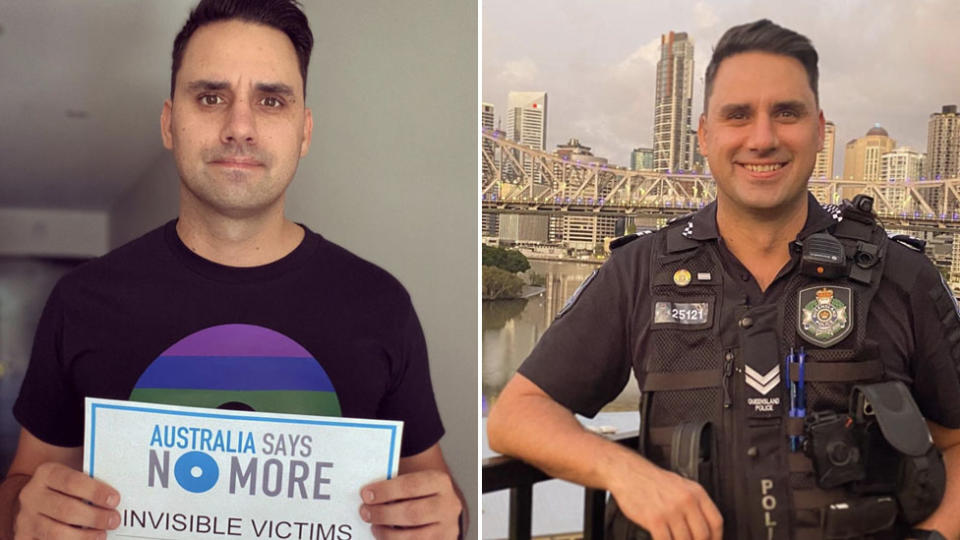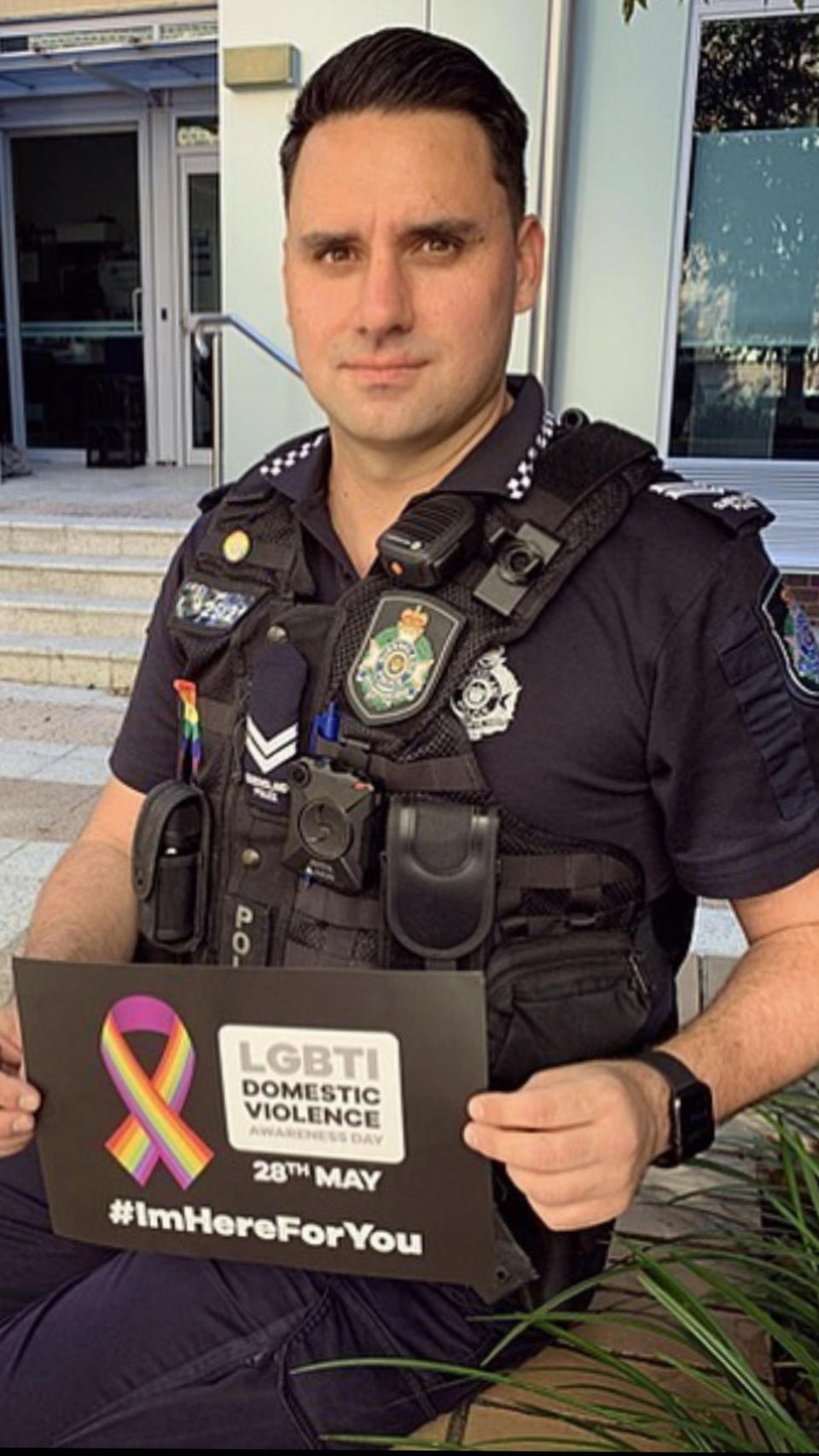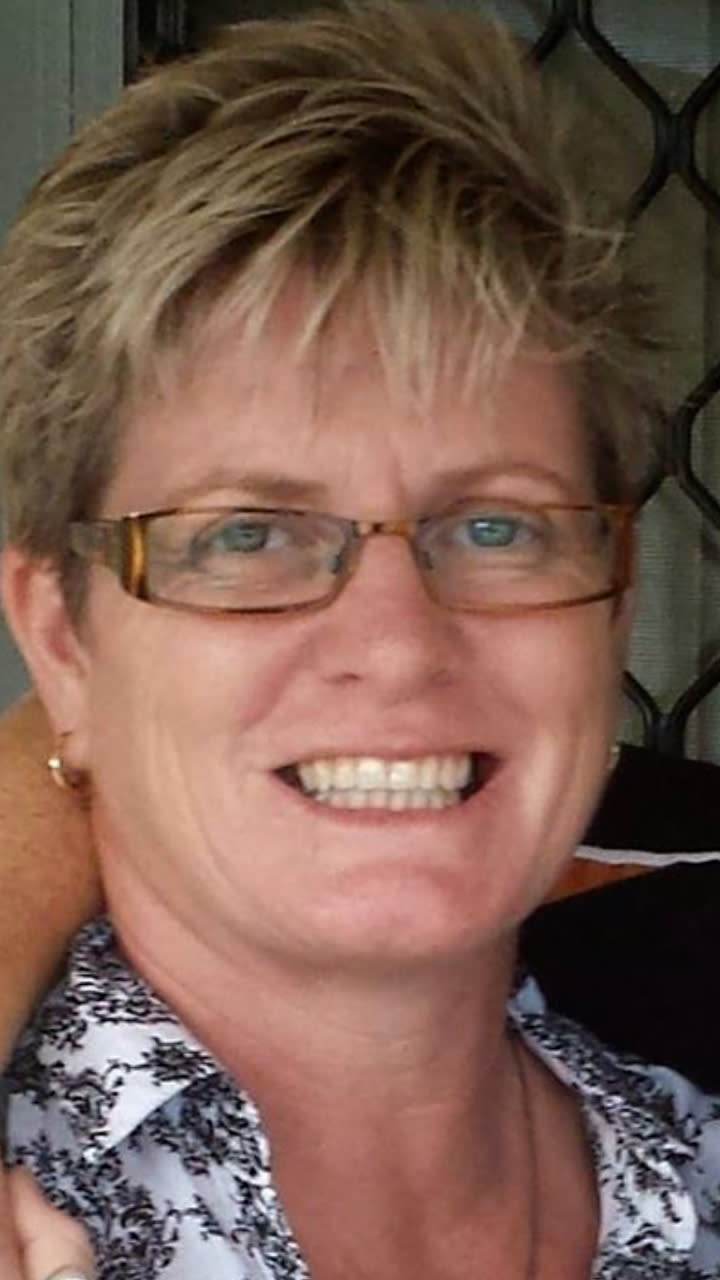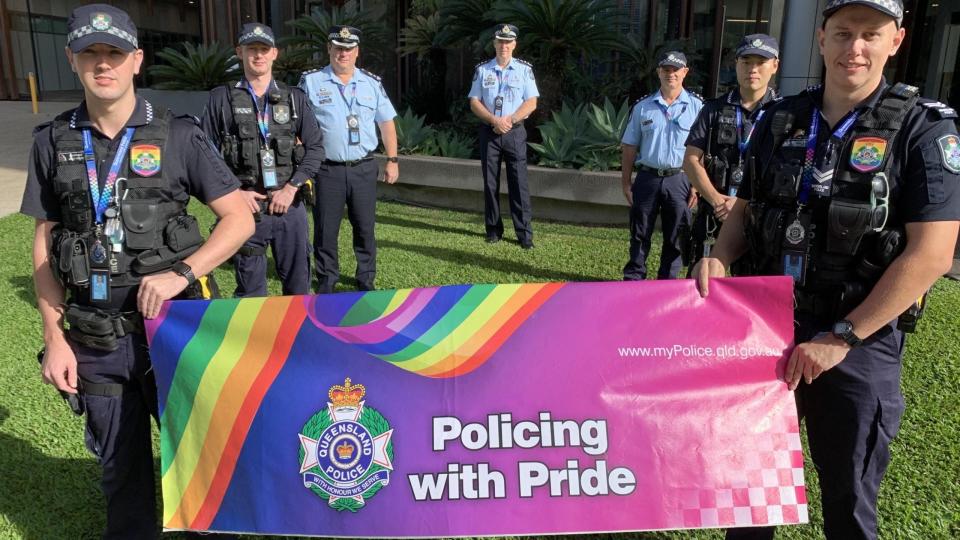Domestic violence survivor speaks out about community with high abuse rate
Ben Bjarnesen thought he had broken free of his violent relationship, but his former partner’s threats of suicide forced him to return.
Now a senior constable with Queensland Police, Mr Bjarnesen is speaking out about the high level of domestic violence in the LGBTI community by revealing his own traumatic experience.
“I was in an abusive relationship for just over two years,” he told Yahoo News Australia.
“It started off as just verbal and emotional abuse, shortly after it escalated to physical, and, property damage.
“I even moved out into another place and ended it, then got manipulated into coming back again.”

Mr Bjarnesen, 35, said there were threats of suicide from his partner “if he didn't come back”.
“Domestic violence is generally spoken about as a heterosexual issue, with males perpetrating violence against women,” he said.
“The gendered nature of the DV sector doesn’t always work for LGBTI people seeking help because the [support] services available are generally aimed at female victims and children.”
As a police officer currently serving in the Queensland Police Force with 13 years of experience, Mr Bjarnesen recognised the importance of specialised domestic violence support services for the LGBTI community.

“It happens at greater levels in our relationships, unfortunately.”
“Even if they [victims] do realise they are a victim, they may not think there is support out there for them,” he said.
By raising awareness about domestic violence in the LGBTI community, Mr Bjarnesen wants to send a message to victims that they will be supported by both first responders and support service providers.
“Contemporary research indicates that the majority of LGBTI communities still avoid contacting police even if they are victims of domestic violence or crimes.”
Before LGBTI rights were recognised
Brisbane woman Sally struggled in a domestic violence situation during a time when LGBTI rights were not recognised.
After coming out and leaving her husband for a same-sex relationship, Sally was ‘let go’ from her family to navigate the fallout on her own as they threw their support behind her ex-husband.
“I left my husband for my partner at 34.”
“I had no idea what ‘being gay’ was, but I knew life was different and things weren't right,” she said.
“I was told I wasn’t a part of the family anymore.”
Sally spent three-and-a-half years with her first female partner after leaving her marriage. Over time, she began to notice ‘red flags’ but didn’t speak out because she ‘didn’t believe she had any rights’ to do so.
“At first, it was really, really good but unfortunately, she was a jealous and possessive type of person.”
“I took that to be loving and caring and perhaps there was some blurring of the boundaries there,” she said.

Sally suffered in silence as the relationship deteriorated over time, and ‘felt isolated’ due to the lack of support services available for the LGBTI community at the time.
“She [her ex-partner] was also a heavy drinker, I wouldn’t say an alcoholic, but close,” she told Yahoo News Australia.
“I wasn’t allowed to go to the shops for longer than 10 minutes – if I had stopped to talk to a friend, I was doing something wrong.”
‘I didn’t realise it was a DV situation’
According to Sally, she didn’t immediately recognise that she was involved in an abusive relationship. It took a visit to a counsellor after being advised by trusted close friends to seek help.
“I didn’t even realise I was in a DV situation, I had to work that out for myself.”
“DV can be emotional, it can be physical, it can be verbal, withholding finances, it can be threatening to ‘out somebody’, it can be withholding medication,” she said.
“No one should make you feel anything less than worth it, if you are in a situation with someone that is not giving you 100% feeling of worthiness - get out.”
Even though Sally was afraid of ‘things getting worse’ and physical abuse, she didn’t call the police for help because she didn’t think they would be interested in responding to a call from somebody in a same-sex relationship.
“LGBTI people experience the same issues that heterosexual people experience.”
“Same-sex relationships were just not recognised so, I didn’t think there were any rights,” she said.
“I didn’t go to the authorities because I didn’t believe that it was something they did back then.”

Today, Sally works at an LGBTI support service and firmly believes in raising awareness about domestic violence because ‘everybody should be able to reach out to resources, services, and help’.
“We need to talk about it, we need to start a conversation.”
“LGBTI people have rights alongside everyone else,” she said.
“There should be no division, every person should be able to reach out to get the help and services they need.”
#ImHereForYou hashtag raises awareness
After Prime Minister Scott Morrison announced $328 million of funding for domestic violence prevention as part of the government’s plan to keep Aussies safe earlier this year, Mr Bjarnesen launched Australia’s first LGBTI Domestic Violence Awareness Day on May 28.
The day aims to highlight the high levels of domestic violence in the LGBTI community that largely goes unreported.
“We've got awareness days for all these different communities and minority groups, yet there wasn't one for the LGBTI community,” he said.
As the founder of the annual LGBTI Domestic Violence Awareness Day, Mr Bjarnesen is aiming to improve levels of reporting from LGBTI people who are being impacted by domestic violence but suffering in silence. The official hashtag for the day is #ImHereForYou because the phrase sends a clear message of support.
“It’s a great way for people to show support to victims and survivors of domestic violence,” Mr Bjarnesen said.
According to Mr Bjarnesen, LGBTI people experience additional barriers when it comes to reporting abuse, including the belief that they will be discriminated against by first responders.
“It’s so important that people from LGBTI communities know that help is available for them.”
“A lot of LGBTI people think that people [in the greater community] won’t understand them or their relationships,” he added.
A post shared by LGBTI DV Awareness Day (@lgbti.dv.awareness.day) on May 29, 2020 at 2:29am PDT
In Mr Bjarnesen’s 2016 Churchill Fellowship study, he travelled to the USA, Canada, England, Scotland and the Netherlands to research methods in which ‘police forces can enhance the way they respond to domestic violence in LGBTI communities’.
His project work helped identify and develop improved methods for engaging with LGBTI communities that first responders can adopt when managing same-sex domestic violence incidents.
“The LGBTI community has come a long way with respect to equal rights and the police have come a long way as well.”
“LGBTI people don’t have to live with abuse and everyone, regardless of their sexuality or gender identity, deserves to live a life free from violence and abuse,” he said.
“There is support and help out there for them, they just needed to reach out for it.”
For more details about how you can show your support, visit the LGBTI Domestic Violence Awareness Day website and keep up to date on their Facebook page, or Instagram page.
If you or someone you know is impacted by sexual assault, domestic or family violence, call 1800RESPECT on 1800 737 732 or visit 1800RESPECT.org.au.
Readers seeking support and information about suicide prevention can contact Beyond Blue on 1300 22 4636, Lifeline on 13 11 14 or Suicide Call Back Service on 1300 659 467.
Do you have a story tip? Email: newsroomau@yahoonews.com.
You can also follow us on Facebook, Instagram and Twitter and download the Yahoo News app from the App Store or Google Play.



